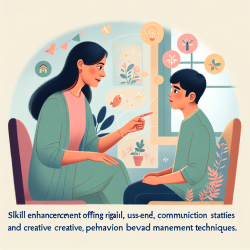Introduction
In the field of speech-language pathology, particularly within the realm of online therapy services like those provided by TinyEYE, it is crucial to continuously seek ways to improve service delivery and outcomes. The research titled "Unofficial policy: access to housing, housing information and social services among homeless drug users in Hartford, Connecticut" offers insights that, while focused on housing and social services, can inspire practitioners to enhance their skills and service delivery in online therapy. This blog explores how the findings of this research can be applied to improve outcomes for children receiving online therapy.
Understanding Unofficial Policies
The research highlights the impact of unofficial policies—those informal practices and decisions made by service providers—on access to housing and services. In the context of online therapy, unofficial policies can be likened to the informal practices therapists adopt in their virtual sessions. These can significantly influence the therapeutic outcomes for children.
Implementing Research Insights
Here are some ways practitioners can implement insights from the research to improve online therapy outcomes:
- Enhance Communication: Just as housing caseworkers play a crucial role in disseminating information, therapists should ensure clear and consistent communication with parents and caregivers. This involves setting clear expectations, providing regular updates on progress, and being available for consultations.
- Tailor Interventions: The concept of "creaming" versus "silting" from the research can be applied by tailoring interventions to meet the specific needs of each child. This means prioritizing resources and time for children who may benefit the most from intensive interventions while ensuring all children receive the support they need.
- Reduce Barriers: The research discusses the barriers faced by homeless individuals in accessing services. In online therapy, reducing barriers might involve ensuring that technology is accessible and user-friendly for all families, providing training sessions for parents, and offering flexible scheduling options.
Encouraging Further Research
Practitioners are encouraged to delve deeper into the research to explore additional ways to enhance their practice. Understanding the nuances of how unofficial policies affect service delivery can inspire innovative approaches in online therapy.
Conclusion
By drawing parallels between the research on housing policies and the delivery of online therapy services, practitioners can gain valuable insights into improving outcomes for children. Embracing a data-driven approach and being open to learning from diverse fields can lead to more effective and impactful therapy sessions.
To read the original research paper, please follow this link: Unofficial policy: access to housing, housing information and social services among homeless drug users in Hartford, Connecticut.










